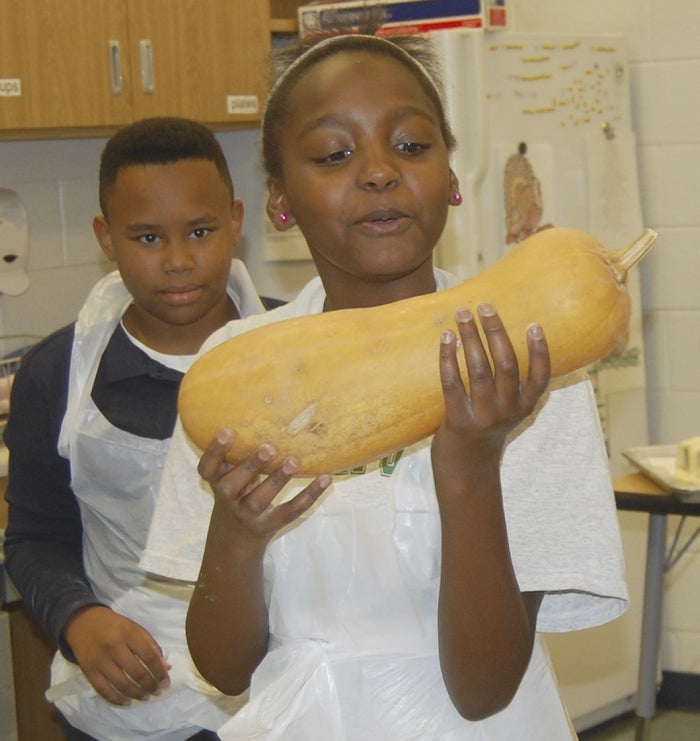From seed to plate: Middle schoolers take hands-on approach to agriculture
Published 12:00 am Thursday, December 18, 2014

- A member of the cooking club inspects a fresh squash from Downing's farm. Jeanie Groh/Salisbury Post
KANNAPOLIS — Kannapolis Middle School students grow their veggies and eat them too.
This year, the school is capitalizing on a unique partnership between its agriculture science classes, taught by Tim Downing, and its culinary club, led by David Depompa.
“We teach kids about fresh food, diet and where that food comes from,” Downing said.
Downing has been teaching for 18 years, and has held a variety of roles from athletic director to core science and math teacher. In the past, he split time between teaching agriculture science and core science classes, but this year, he began teaching agriculture full time to 125 students.
When he’s not at school, Downing farms an 11-acre vegetable farm, which lends him the necessary expertise to teach his classes.
“Our farm is able to support what we do here,” he said, adding that the students are able to come to his farm, and he uses stories and case studies from his own experience to add depth to the class.
The half-year agriculture science class combines hands-on experience with a deeper knowledge of plant science, soil science stewardship, natural resources and nutrition.
Students learn that agriculture is vital to life, Downing said. “The agriculture industry produces everything you eat, wear and the roof over your head.”
This year, students were able to use the school’s new STEM, or science, technology, engineering and math, lab to focus on soil science.
They were able to check for key plant nutrients from staff members’ gardens and make recommendations based on the soil levels.
Downing tries to give the students an overview of the entire farming experience, from planning, to planting and harvesting, to marketing a farm.
Agriculture is “so broad and vast,” Downing said. “Every kid connects to agriculture in a different way.”
Each semester, the students plan out a 60-foot by 30-foot mini farm on the school’s property.
They decide where they want to plant each vegetable, then till the land, set up the irrigation, plant and tend to the vegetables and eventually harvest a crop. They also name their plots, work on a marketing plan and design their own signage.
“I tried to do everything in the kids’ field that mimics on a small scale what a small farmers’ vegetable field might look like,” Downing said.
Some of the students thrive with the planning and marketing side of things, while others “just want to put their hands in the dirt,” he added.
The students do all the work themselves, and Downing said it’s important to let them make their own mistakes.
Success won’t be measured by yield, but by what students learned, he said.
“But as a farmer I really want to see a decent yield,” he laughed.
During the fall semester, the class planted kale, radishes, lettuce, broccoli, carrots, spinach and cabbage. In the spring, they’ll plant more popular vegetables such as tomatoes and cucumbers.
The students aren’t just learning about how to plant the vegetables, but discuss the importance of those foods as well.
“We hit hard on the food nutrition aspect,” Downing said. “That part is of particular importance, especially in this area.”
That’s where the culinary club comes in.
Depompa, who is a professional chef, shows his students how to prepare these vegetables in an appetizing way.
“They’re starting to understand vegetables aren’t just what they’re used to,” Depomap said.
Not only does he teach them how to prepare healthy foods, but Depompa uses the vegetables the agriculture science class harvests in his cooking club.
“I fed radishes to 130 kids and many of them came back for more,” Downing said, explaining that it was important for them understand how to cook these foods.
“People need to know how to enjoy them,” he added.
Depompa has also taught his students how to make broccoli salad, kale salad and kale chips.
He said the kale chips were especially popular.
“You have to get them excited about it,” he said.
“We’re not going to make farmers out of everyone. If we can create a better food consumer, we’ve done our job,” Downing said.
Contact reporter Jeanie Groh at 704-797-4222.


